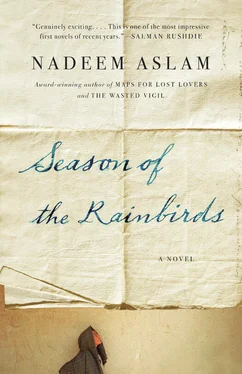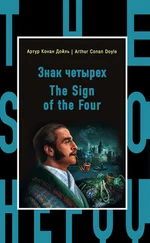‘Well, that cuts down our work.’ Saif Aziz nodded at the photographer and grinned. ‘Now we only need to talk to sixty-six people.’
BY the time Zafri slaughtered the seventh goat a crowd of beggars had gathered outside Judge Anwar’s house. Indifferent to the rain, beggars of all ages — from very young to extremely old — jostled and fought each other to reach the front door. One seemingly able-bodied man wore a framed statement around his neck that carried his picture and proclaimed him deaf, dumb and blind. Azhar and Dr Sharif made their way into the house with difficulty. A blind woman — irises flickering for lack of anything to focus on — cursed loudly when Azhar pushed her aside. She was accompanied by a young girl who had tangled hair and clogged nostrils. The old woman’s left hand rested on the girl’s right shoulder.
‘This isn’t the granddaughter you had with you last week,’ Azhar shouted over his shoulder as he crossed the rainy courtyard.
The woman recognised the deputy commissioner. ‘The other one is getting old, deputy-sahib.’ She turned her blind eyes towards Azhar and shouted out her reply. ‘I can’t drag her around for every Ayra, Gyra and Natho-khyra to lay eyes on.’
Plants had been taken down from the eaves. Instead, from the hooks hung the disembowelled carcasses of the seven goats. The black-and-white checked floor of the veranda was wet with orange, watered-down blood and fluids the colour and consistency of melted butter. The pots of ferns were set against the back wall, and next to them in a neat row were the heads of the sacrificed goats. Their small eyes were like marbles. The long, velvet-encased ears rested softly on the tiles like robes. The ribbed horns curved backwards and touched the wall.
Despite the rain both Dr Sharif and Azhar hesitated before stepping on to the veranda. The young boy assisting Zafri was dragging the eighth goat on to the veranda by the rope around its neck. The animal, sensing the danger, struggled and bleated. Zafri held the knife between his teeth and, with a quick movement of his right foot across the goat’s front legs, threw the animal to the floor. His movements from then on were perfectly co-ordinated; the actions of the assistant, however, as he grappled with the writhing rump and hind legs, were haphazard and betrayed his lack of experience. Once the animal was overpowered, the boy shouted for Asgri Anwar.
Asgri emerged from the room adjoining the veranda — the room where Judge Anwar was killed. She carried her youngest daughter on her hip. It was necessary for the person in whose name the sacrifice was being made to touch the knife. Zafri raised his head, the blade between his teeth, and the little girl reached down to touch the wooden handle.
Zafri took the knife from his mouth and — his lips moving as he read the appropriate verses — opened the animal’s throat with short, precise cuts. Azhar watched for a few moments then looked away. Buzzards and kites and vultures floated above the house. Crows topped the outside walls, evenly spaced as though arranged there by a human hand.
‘So how’s my friend Gul-kalam, deputy-sahib?’
A few moments passed before Azhar realised that Zafri had addressed him. Asgri, on her way back to the room, stopped and looked back at the butcher. He was concentrating on the blood gushing out of the opening in the throat, his knees pinning the dying animal to the floor. The blood poured out with great force: it was almost as though it was this force, and not the knife, that had torn open the blood vessel.
Dr Sharif said under his breath, ‘Death may be an important part of nature but there’s nothing more unnatural than a dying animal.’
The boy let go of the hind legs. The animal had stopped trying to kick. And within the next minute an eighth head joined the other seven by the wall. Dr Sharif noticed that one of Zafri’s fingers was bandaged. He remarked on it.
‘I cut it on a bone,’ Zafri explained. ‘Now I understand why the cave people used to make weapons out of bones.’
Dr Sharif advised him to stop by at the surgery later. ‘Wounds don’t heal well in the rainy season. Damp, you see. Risk of infection.’
Zafri smiled. ‘You’re not going to pick my pocket that easily, doctor-sahib.’ He gave his eyes an upward roll. ‘I’ll just piss on the cut and cover it with burnt cloth. It’ll be fine by tomorrow.’
Azhar and Dr Sharif left the veranda and entered Judge Anwar’s bedroom. Asgri sat on the bed, surrounded by women. As the men entered Asgri wiped her eyes and rearranged her stole to fully cover her head.
Azhar, seeing her tears, said, ‘You shouldn’t pay attention to Zafri, apa. He’s just careless, uneducated. I’ll talk to him later.’
Asgri rejected the comment. She said to one of the women by her side: ‘It’s not even seven days yet, but I understand that to others it seems like a long time already.’ The woman nodded, shutting her eyes theatrically. ‘So much seems to have happened since then.’
The judge’s daughters — all in white, linseed oil on their hair — were sitting amongst the women. One of the women looked at Azhar and clicked her fingers at the four older girls. Of an age now to be guarded from the eyes of the adult male, they got up silently and left the room. Azhar was not aware of the command but he had registered the distaste that his presence caused on some of the faces in the room.
‘You came about the medicines, doctor?’ Asgri addressed Dr Sharif. The physician answered with a nod, guiltily. The bottles of vibrantly coloured pills, the eggshell-thin vials of injections and the packs of syringes and needles had all been collected in a large box. Dr Sharif took the box from the table and, to avoid having to wrestle with the beggars who were now filling the courtyard, he left by the inside door, emerging on to the back street — the door Judge Anwar would squat by to urinate at night.
It was hot, despite the absence of the sun and despite the fact that it had rained continuously for the past six or seven hours. Azhar pulled the collar of his shirt away from his neck and blew cold breath on to his chest. He sat down on the edge of the only empty chair in the room. With his head bowed and in an unvarying tone of voice, as though reading aloud from a book on his lap, he explained to Asgri the stage which the legal action against the judge’s killers had reached and assured her that he, personally, was supervising the proceedings.
When he finished, Asgri shifted her eyes from her husband’s photograph and nodded briskly. ‘Yes,’ she said. ‘But, Azhar, there is something else. I want you to look through and sort out the papers in the safe. My brothers will need your help and advice when they come back for the tenth-day memorial service on Saturday. We’ve made some decisions. I’m selling everything and going back to Sind. There’s nothing for me here.’ She spoke quietly and softly.
The women let out sighs of protest.
‘No.’ Asgri smoothed away a wrinkle in the guipure counterpane. ‘My mind’s made up. Everything including the house.’ Asgri was from a large feudal family in the south whose land-holdings had been in the family for over three hundred years — since a century before the arrival of the British. An only sister to six brothers, Asgri was dearly loved. It was said that the brothers had been outraged to the point of threatening annulment on discovering, soon after the wedding ceremony, that Judge Anwar smoked cigarettes — something the judge had failed to declare when asking for their sister’s hand in marriage.
Azhar stood up. ‘I’ll come by later, apa.’
‘Be in time for dinner,’ Asgri told him and he nodded. He was aware that some of the women were staring at him with quiet yet defiant hostility.
Читать дальше












